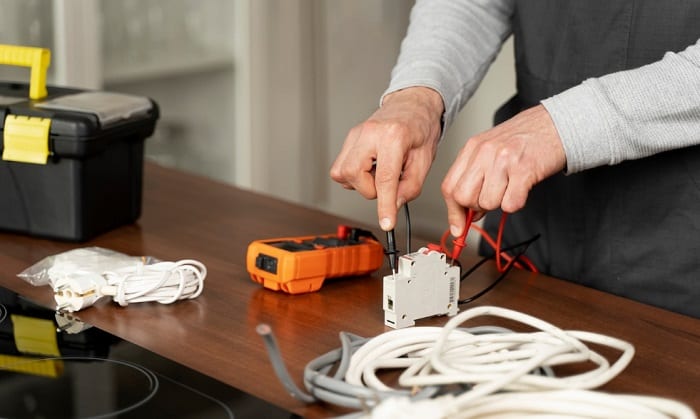Arcing faults are responsible for most domestic electrical fires that kill and injure hundreds of people in the United States each year.
Currently, there are two ways to safeguard your house against this type of problem. You can use either an outlet or a circuit breaker with AFCI function.
In this article, I’ll compare AFCI outlet vs breaker to show you the differences and the benefits of using either of them.
Table of Contents
AFCI Outlet Vs AFCI Breaker
An arc fault is an electrical problem related to sudden changes in the current flow of a circuit. It can cause the wire to overheat past its limit, resulting in a spark that can damage your home or a fire.
We never know when an arc fault can occur in any electrical system. Hence, it is good if we always have protection for this kind of problem.
However, which one is better, the AFCI receptacle or breaker? Let us find out below.
What is AFCI Outlet?
An AFCI outlet is a device that detects a hazardous arc fault. When the arc fault occurs, it can immediately activate and cut the current flow before a fire starts.
You can use this gadget to protect some of your circuits where the AFCI feature is required.
- Quite cheaper than the AFCI breaker
- It does not need to run through the circuit breaker to reset
- Easy to replace and install
- It does not protect other branch outlets, except for the downstream connections.
- Before installation, you might need to locate the main outlet first to be able to give protection to all branch outlets.
What is an AFCI Breaker?
Like having an AFCI outlet, installing AFCI breaker also protects the circuit against arc faults. This device can be used for a branch circuit alongside other standard breakers in a main panel.
It can also provide AFCI protection for the standard household outlet.
- It protects the whole branch circuit and other connected devices
- Easy to install or upgrade
- Quiet pricey compared to the AFCI outlet.
- A little effort is necessary to test and reset the breaker since you need to go to the breaker box every time it trips.
How Does an AFCI Work?
The AFCI function detects and determines which arc faults are dangerous. An arc fault can be of two types: series or parallel.
A series arc fault occurs when a connection is broken. An example of this problem is a broken wire caused by damage or aging.
On the other side, there is a parallel arc fault, which is also hazardous. It happens when two exposed wires touch each other.
In most cases, a parallel arc fault is caused by negligence. It frequently occurs when putting a nail into the wall, stapling wire, and more.
Differences Between AFCI Outlet and Breaker
The AFCI circuit breaker and outlet have the same arc fault function. However, they differ in what circuits or lines they can protect.
An AFCI receptacle can only protect devices connected to it, including other downstream outlets. Anything upstream, including other outlets up to the standard circuit breaker, is not protected by the AFCI function.
In contrast, when AFCI breaker tripping occurs, it cuts off power to all devices on its circuit.
If you also compare the AFCI breaker vs the regular breaker, the AFCI breaker provides a higher level of protection than a regular one.
Cost
The price of an AFCI breaker, such as a Square D AFCI breaker, ranges from $30 to $50 per unit. Meanwhile, an AFCI outlet costs between $20 and $32 per unit.
- Note that these price ranges are only for the unit itself. If you need to install a new circuit, you must consider the cost of the wire, circuit breaker, and outlet you need, as well as the labor fee.
- Safety Tip: Make it a habit to always test your AFCI device once a month. This way, you can maintain its good condition and ensure its features always protect you.
Related Comparisons You May Also Like:
FAQs
AFCI Outlet Vs AFCI Breaker: What is the Difference?
The “Differences” section should already give you an overview of how these devices compare.
Here’s another disparity: If you don’t want to run to your electric panel to reset your breakers, consider installing an AFCI outlet right near your appliances. Your panel, after all, maybe in your garage and far from your living area.
Do AFCI Outlets Protect the Whole Circuit?
AFCI outlet protects the whole circuit only if it is installed as the primary outlet. In this case, any downstream electrical connections, including branch receptacles and extension outlets, will be protected.
Extension outlets refer to the devices and extension cords connected to that AFCI outlet.
However, if the AFCI device is not installed as the primary outlet, anything upstream from it will not receive protection.
When Should You Not Use AFCI Breaker?
In general, if your building or room is not a dwelling unit, AFCI protection is unnecessary. Also, some heat and smoke alarms should not be connected to an arc fault protector; for such devices, it’s best to check the manual of the alarm you’re using.
When to Use AFCI Breaker?
AFCI protection is now required in most parts of a residential house. It is necessary for most house areas with 15-amp and 20-amp circuits for outlets and lighting connections.
These areas are mainly the living room, bedrooms, hallways, some parts of the kitchen, and more.
In case you’re choosing between an AFCI breaker and outlet, use the former if your panel board has space for it and if you want to protect an entire circuit.
Conclusion
The AFCI feature is a helpful tool in every household today as it is required by NEC standards. At the same time, knowing how the AFCI outlet vs breaker differs from each other will allow you to choose the one that’s best for your needs.
Learning how to wire arc fault breakers or outlets can save you some money. However, if you are unfamiliar with home electrical circuits, calling a professional to prevent unnecessary problems is highly recommended.

I am Edwin Jones, in charge of designing content for Galvinpower. I aspire to use my experiences in marketing to create reliable and necessary information to help our readers. It has been fun to work with Andrew and apply his incredible knowledge to our content.



